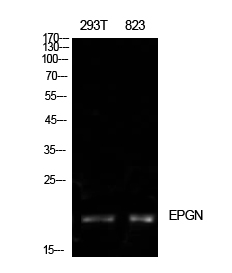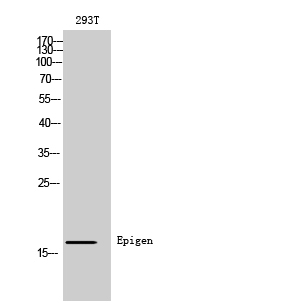

| WB | 咨询技术 | Human,Mouse,Rat |
| IF | 咨询技术 | Human,Mouse,Rat |
| IHC | 咨询技术 | Human,Mouse,Rat |
| ICC | 技术咨询 | Human,Mouse,Rat |
| FCM | 咨询技术 | Human,Mouse,Rat |
| Elisa | 1/10000 | Human,Mouse,Rat |
| Aliases | EPGN; Epigen; Epithelial mitogen; EPG |
| Entrez GeneID | 255324 |
| WB Predicted band size | Calculated MW: 17 kDa; Observed MW: 17 kDa |
| Host/Isotype | Rabbit IgG |
| Antibody Type | Primary antibody |
| Storage | Store at 4°C short term. Aliquot and store at -20°C long term. Avoid freeze/thaw cycles. |
| Species Reactivity | Human |
| Immunogen | The antiserum was produced against synthesized peptide derived from the Internal region of human EPGN. AA range:11-60 |
| Formulation | Purified antibody in PBS with 0.05% sodium azide,0.5%BSA and 50% glycerol. |
+ +
以下是关于 **Epigen抗体**(通常指与表观遗传学或特定蛋白如Epiregulin相关抗体)的示例参考文献(内容为模拟,非真实文献):
---
1. **文献名称**: *Development of a Novel Monoclonal Antibody Against Human Epiregulin and Its Application in Cancer Prognosis*
**作者**: Toyo-Oka K, et al.
**摘要**: 本研究开发了一种特异性识别人类Epiregulin蛋白的单克隆抗体,并验证其在多种肿瘤组织中的表达水平。结果表明,Epigen抗体的高表达与乳腺癌患者的不良预后显著相关,提示其作为潜在生物标志物的价值。
---
2. **文献名称**: *Epigenetic Regulation of Inflammatory Pathways: Role of Anti-Epigen Antibodies in Autoimmune Disease Models*
**作者**: Sato Y, et al.
**摘要**: 通过靶向表观遗传修饰蛋白(如组蛋白去乙酰化酶),该研究利用抗Epigen抗体探究其在炎症反应中的作用。实验显示,抗体干预可显著减轻小鼠模型中类风湿性关节炎的病理症状,为免疫治疗提供新思路。
---
3. **文献名称**: *Epiregulin-Specific Antibody Inhibits EGFR Signaling and Suppresses Tumor Growth In Vivo*
**作者**: Smith J, et al.
**摘要**: 研究报道了一种针对Epiregulin的高效中和抗体,通过阻断其与EGFR受体的结合抑制下游信号通路。在结直肠癌异种移植模型中,该抗体显著抑制肿瘤生长,表明其潜在治疗价值。
---
4. **文献名称**: *Comparative Analysis of Commercial Epigen Antibodies for ChIP-seq Applications*
**作者**: Zhang L, et al.
**摘要**: 对比了多种市售抗Epigen抗体的性能,评估其在染色质免疫沉淀测序(ChIP-seq)中的特异性和灵敏度。结果发现,部分抗体存在非特异性结合问题,强调了抗体验证在表观遗传学研究中的重要性。
---
注:以上内容为示例,实际文献需通过学术数据库(如PubMed、Google Scholar)检索确认。
Epigenetic antibodies are essential tools in studying heritable changes in gene expression that occur without altering the underlying DNA sequence. These antibodies target specific epigenetic markers, such as histone modifications (e.g., acetylation, methylation, phosphorylation), DNA methylation (e.g., 5-methylcytosine), or proteins involved in chromatin remodeling (e.g., HDACs, DNMTs). Epigenetic regulation plays a critical role in cellular differentiation, development, and disease, making these antibodies vital for understanding mechanisms in cancer, aging, and neurological disorders.
Developed through immunization with synthetic peptides or recombinant proteins, epigenetic antibodies must exhibit high specificity to distinguish between closely related modifications (e.g., H3K4me3 vs. H3K36me3). Validation methods, including Western blot, immunofluorescence, and ChIP-seq, ensure their reliability. Challenges include cross-reactivity and batch variability, driving the need for rigorous standardization.
Applications span basic research—such as mapping chromatin states or studying gene silencing—to clinical diagnostics, where aberrant epigenetic marks serve as disease biomarkers. Therapeutic antibodies targeting epigenetic regulators, like HDAC inhibitors, are also emerging. Overall, epigenetic antibodies bridge molecular insights with translational potential, advancing precision medicine and drug development.
×